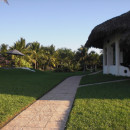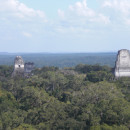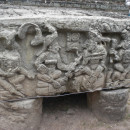Amazing Archaeology Past Review
By Lauren S (Fordham University) - abroad from 01/15/2012 to 05/06/2012 with
Boston University: Antigua & San Bartolo - Guatemala Archaeology Program
This was the craziest, silliest four months of my life. I never imagined I'd spend time in Central America, learn Spanish, and work at an archaeological site (especially one currently all over National Geographic, CNN, etc.) It was totally worthwhile. In all honesty, it helped me realize that I didn't want to pursue archaeology as a career, but that doesn't make it any less extraordinary in my eyes. Though I'm not allowed to discuss specific things about the site, I will say that I got to work directly with what I was most interested in. And my studies are focused on Forensic Anthropology. I definitely changed and grew as a person, learned a lot about myself, what I'm capable of, archaeology on the whole, and Meso American and Mayan history. I would take this over Europe or Australia or wherever any day. You can go there anytime and you may not be able to go work at ancient Mayan ruins ever again. Just saying...
Review Photos



Personal Information
| How much international exposure did you have prior to this program? | 2 weeks - 1 month |
Review Your Program
|
* Overall educational experience
Academic rigor, intensity, resources, etc. |
With the exception of one three hour seminar class a week and enrollment in a Spanish language school for the first month in Antigua, there is no "classroom style" learning. Your credits are earned by doing archaeological fieldwork Mon-Fri from about 7:30 AM to 4 PM. |
|
* Host Country Program Administration
On-site administration of your program |
Really great. Not always organized down to the T which could be a little stressful at times but hardly really a problem. |
|
* Housing:
How satisfied were you with your living arrangements? |
Spent the first month with a lovely homestay family in Antigua. The following three months were spent living at the camp site. You live in a tent that you share with another person from the program, shower in makeshift showers with river water, the bathrooms are latrines. The accommodations are actually pretty nice for being in the middle of the jungle. If you can keep a sense of humor about how ridiculous it all is, you will be fine. Plus, you'll have so many other students there dealing with the same strange new living arrangements as well. You're really in it together. |
| * Food: |
In Antigua, homestay provided all weekday meals and they were always great. There are trips most weekends and meals are provided at the hotels. On Sunday night, dinner is in Antigua with the grad students and Bill. At site, breakfast, lunch, and dinner are prepared by the cooks. There will almost always be beans and rice as you meal or with it and there are fresh made corn tortillas EVERY meal (unless they make flour ones, which are also delicious). The food can be tough to adjust to, and many things are fried. There's usually meat on Monday and Tuesday since it comes in fresh over the weekend. They will accommodate for vegetarians though. Also, there is hardly any dairy ever because there's no refrigeration. There aren't many other options though except for the snacks that you bring with you. Sometimes on the weekends, grad students will go back out to civilization and if you give them money they can buy you one or two things. Peanutbutter, Nutella, granola bars, and cookies were pretty common. |
|
* Social & Cultural Integration:
How integrated did you feel with the local culture? |
Overall, the people of Guatemala were welcoming and friendly towards us. Generally, if you make an attempt to speak Spanish and try your hardest to converse and smile, people will be kind to you. Guatemalans speak pretty clear and slow Spanish, which is helpful. My homestay mom was extremely friendly and welcoming and really took care of us. There were several other students from other programs staying at her house as well and whenever one left, she would throw a little party with lots of great home cooked food and dancing. She even invited over a missionary group in the area. I had the chance to see a lot or really great places in Guatemala (Lake Atitlan, Monterrico), climb Mt. Picaya, visit a local chocolate factory, volunteer at a local shelter, and also see some Maya sites before heading into camp (Copan, Tikal, Quirigua) |
|
* Health Care:
How well were health issues addressed during the program? |
Everyone was really well taken care of on the trip. The director's wife is a nurse and was always there to help people when they don't feel well or field questions. The adjustments to the conditions can be tough at first, especially for girls, but you could really ask her anything. If there are any serious medical issues, they aren't afraid to send someone out in a truck back to Flores, Guatemala to go to a doctor or hospital if need be. |
| * Safety: |
Antigua itself was not super safe. Going anywhere at night isn't all that advisable unless you are in a big group. Tuk Tuk (little rickshaw cabs) can be taken places until 10pm but after that you have to get a cab. There were 3 attempted robberies of students in my group during the trip, myself included. People will scout you out and get to know your routine, so just be cautious and aware. This makes it sound scarier than it was but you should be on your toes. The jungle has your typical jungle stuff: poisonous snakes, spiders, scorpions, pumas, jaguars, lots of bugs. You'll definitely see snakes, scorpions and the bugs and spider, probably not the other ones. If there any snakes in camp, the poisonous ones are killed by the workers. You'll probably learn to kill a scorpion after watching the workers cut off their tails, play with then, then kill them with a rock. You really are quite safe, I never once felt threatened by the animal life. |
| If you could do it all over again would you choose the same program? |
Yes
|
Finances
|
* Money: How easily were you able to live on a student's budget?
(1 = not very easy/$200+ on food & personal expenses/week, 2.5 = $100/week, 5 = very easily/minimal cost) |
In the first month in Antigua, meals and travelling expenses are already covered in your tuition. You only spend money on whatever else you want to buy, personally (including any alcoholic beverages at meals. Other drinks are paid for though). At site, there is nothing to pay for except for any compras you may want on the weekend and if you wanted to visit one of the worker's tienda, which sold soda and lollipops and cookies for real cheap. Also, at the time, one US dollars was about 7.5 Quetzals. Everything was pretty cheap. |
| * Was housing included in your program cost? | Yes |
| * Was food included in your program cost? | Yes |
| Not including program expenses, about how much money did you spend on food and other expenses each week? | $50 |
| Do you have any general money-saving tips for future study abroad participants? | Don't spend needlessly on foods or products you don't really need. Spend your money on the awesome excursions and the occasional treat and gifts for people back home. You'll remember rock climbing more than the extra bottle of shampoo |
Language
| * Did your program have a foreign language component? | Yes |
|
How much did the program encourage you to use the language?
0 = No encouragement, 5 = frequent encouragement to use the language |
Full immersion in the homestay and there were plenty of Guatemalan workers at site who spoke no English |
| How would you rate your language skills at the beginning of the program? | Beginner |
| How would you rate your language skills at the end of the program? | Intermediate |
| What was the highest level language course you had completed prior to departure? | Spanish IV |
| How many hours per day did you use the language? | |
| Do you have any tips/advice on the best ways to practice the language for future study abroad participants? | Don't shy away from using the language at site. But also, don't feel pressured. |
Other Program Information
|
* Where did you live?
Select all that apply |
|
|
* Who did you live with?
Select all that apply |
|
|
* Who did you take classes with?
Select all that apply |
|
| About how many local friends did you make that you will likely keep in touch with? |
A Look Back
| * What did you like most about the program? |
|
| * What could be improved? |
|
| * What do you know now that you wish you knew before going on this program? | No one cares what you smell like. Also, there's this bar called The Ocelot by Parque Central in Antigua. Happy Hour 5-6. Cuba Libres 5 quetzals each! (roughly 75 cents!) Do it. |
Individual Course Reviews
| Course Name/Rating: |
Intro to Spanish |
| Course Department: | Language |
| Instructor: | Fransisco Maroquin Language School |
| Instruction Language: | Spanish |
| Comments: | As someone who has never been good at languages and hadn't studied Spanish since my junior year of high school, I was nervous about the prospect of taking this class. Honestly, the class had such a great, laid back atmosphere that it was actually so easy to learn the language. It is you and your professor (who changes every week) in a cute little outdoor cubicle in a backyard/garden setting basically talking in Spanish for three and a half hours. Of course, you learn grammar and vocabulary and there are some book exercises, but you become so comfortable with speaking because you are constantly talking. In this way, grasping the spoken language is much easier than in an American classroom. The teachers are all very nice and they were used to students with no experience, so there's no reason to ever feel embarrassed or dumb. Many of the teachers don't speak much English themselves, so you WILL be using Spanish all the time. I learned much more Spanish here than I ever did in school. There are tests at the end of every week but you teacher will basically tell you what is on it beforehand. Also, I'm not sure how important these grades really are to the people running the program. They just want you to be learning whilst in Antigua and want you to be able to converse with people. |
| Credit Transfer Issues: | Transfer credits that don't effect GPA if you're a Fordham student, at least. |
| Course Name/Rating: |
Archaeological Field Methods |
| Course Department: | Archaeology |
| Instructor: | Bill Saturno, BU Archaeology grad students, Guatemalan archaeologists. |
| Instruction Language: | English / Spanish |
| Comments: | It was so wonderful to have a break from the classroom setting to do real hands-on archaeological work. I don't think one can possibly know that he or she wants to pursue archaeology without actual field experience- the impression you get from a classroom just doesn't cover it. Whether you want to be an archaeologist or not, this was a truly unique and invaluable experience that anyone can learn and grow from. The grad students were great teachers and mentors. Bill Saturno, the head of the project, was also at site often tending to lots of different areas. Everyone was very friendly and helpful. |
| Credit Transfer Issues: | The credits show up as transfer credits, which means the grades don't effect your GPA, for better or worse. |








